Reminiscing

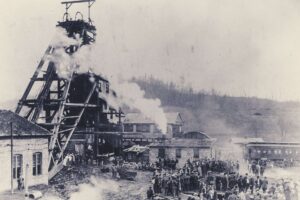 If you lived in Eccles, West Virginia in 1914, you or someone in your family most likely worked at the Eccles Mine Number 5. Eccles was a tiny town in Raleigh County. Mine number 5 was opened in 1905, and by 1914, the mine employed most of the local men and even the teenagers. Life was mundane for the most part. Not much happened in the town, and April 28, 1914 promised to be just another boring day. On that Tuesday morning, dozens of local men and teens left their homes to go to work at the Eccles Mine Number 5, which was one of group of coal mines in West Virginia owned by the New River Colliers Company. Everything was going along fine, when suddenly, at 2:30pm, a sudden explosion rocked the Number 5 mine. In an instant, more than 180 workers who had left home as usual that day, would never go home again.
If you lived in Eccles, West Virginia in 1914, you or someone in your family most likely worked at the Eccles Mine Number 5. Eccles was a tiny town in Raleigh County. Mine number 5 was opened in 1905, and by 1914, the mine employed most of the local men and even the teenagers. Life was mundane for the most part. Not much happened in the town, and April 28, 1914 promised to be just another boring day. On that Tuesday morning, dozens of local men and teens left their homes to go to work at the Eccles Mine Number 5, which was one of group of coal mines in West Virginia owned by the New River Colliers Company. Everything was going along fine, when suddenly, at 2:30pm, a sudden explosion rocked the Number 5 mine. In an instant, more than 180 workers who had left home as usual that day, would never go home again.
The explosion was caused by coal-seam methane. At least 180 men lay dead, at least that was the death roll published as of 2011 by the National Coal Heritage Trail. A monument at the cemetery lists 183 victims, and 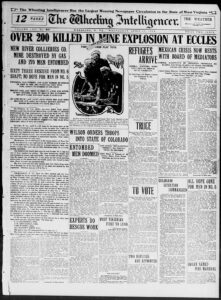 the records of the county coroner list 186. When the mine was rocked by a series of violent explosions, parts of the mine collapsed while other parts were heavily damaged, which trapped the miners inside. Of course, the people of Eccles and officials from the mining company rushed to the scene to aid the rescue efforts. Despite their best efforts, it was soon obvious that this would be a recovery effort, and not a rescue. That day, all of the miners in Eccles Mine Number 5 were killed, including five who were under the age of 14 years of age. In addition, nine workers in a nearby mine were killed when deadly gas from Mine Number 5 seeped into their mine. Ironically, one of the men who died in the nearby mine, was an insurance agent from Charleston, West Virginia, who had only gone into the mine to solicit business from the men. He was only there for a few minutes. It was there that the salesman, who had unfortunately chosen that day to visit the mine and sell insurance to its workers, was also killed. The blast and the subsequent damage to the mine, left many of the victim so mangled and torn apart, that most of them could not be positively identified because of their horrific injuries.
the records of the county coroner list 186. When the mine was rocked by a series of violent explosions, parts of the mine collapsed while other parts were heavily damaged, which trapped the miners inside. Of course, the people of Eccles and officials from the mining company rushed to the scene to aid the rescue efforts. Despite their best efforts, it was soon obvious that this would be a recovery effort, and not a rescue. That day, all of the miners in Eccles Mine Number 5 were killed, including five who were under the age of 14 years of age. In addition, nine workers in a nearby mine were killed when deadly gas from Mine Number 5 seeped into their mine. Ironically, one of the men who died in the nearby mine, was an insurance agent from Charleston, West Virginia, who had only gone into the mine to solicit business from the men. He was only there for a few minutes. It was there that the salesman, who had unfortunately chosen that day to visit the mine and sell insurance to its workers, was also killed. The blast and the subsequent damage to the mine, left many of the victim so mangled and torn apart, that most of them could not be positively identified because of their horrific injuries.
In the early 1900s, coal was in great demand. Production in the United States had increased from 50 million tons of coal in 1850 to 250 million tons of coal in 1903. Unfortunately, the increasing demand and the rush to supply, brought with it worsening work conditions. The danger occurred when the men were digging for coal in deep mines, in which chambers of gas lay just underneath. That meant that highly explosive gasses could come into contact with carbide headlamps. The next thing they knew, they had an explosion on their hands. The mine 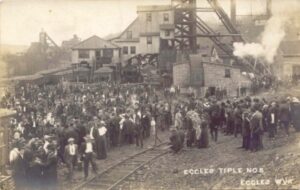
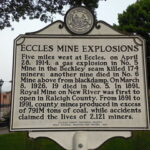 disaster brought attention to an overall safety problem in the West Virginia mining industry. Sadly…at least in that it didn’t happen sooner, the disaster actually aided the unions’ attempts to improve the workers’ conditions. The labor union helped to ban carbide headlamps in West Virginia. It was suspected that the headlamps were most likely the cause of the Eccles explosion, as well as a second mine explosion 18 years later in Illinois.
disaster brought attention to an overall safety problem in the West Virginia mining industry. Sadly…at least in that it didn’t happen sooner, the disaster actually aided the unions’ attempts to improve the workers’ conditions. The labor union helped to ban carbide headlamps in West Virginia. It was suspected that the headlamps were most likely the cause of the Eccles explosion, as well as a second mine explosion 18 years later in Illinois.
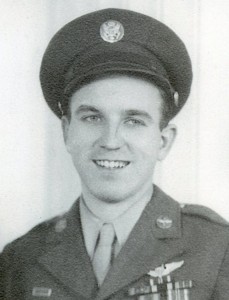
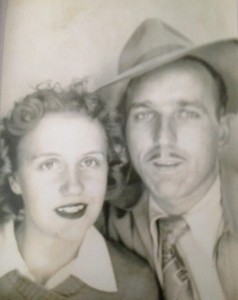 I have been studying a lot lately about World War II. It is my “favorite” war…if one can have a favorite war. My dad, Allen Spencer was a Staff Sergeant in World War II. He served as flight engineer and top turret gunner on a B-17G, the flying fortress. The more I study World War II, the more I realize just how dangerous was…no matter what branch of the service a soldier was in. Dad’s family was one that didn’t have to suffer the loss of their soldier, because my dad came home after the war. He was the only one in his family that saw action in World War II, other than his half-brother, Norman Spencer. Dad’s older brother, Bill tried to serve, but due to flat feet and a hernia, he was turned down. My Uncle Bill was devastated by the rejection. My dad was his little brother, and he had always felt a need to protect him, not because Dad was accident prone or anything, but because he was his little brother. Now, he was going to have to let Dad go without the “backup” that Uncle Bill had hoped to provide. That was one of the hardest things my Uncle Bill ever had to do. So, Dad went with angel backup instead…and his mother’s prayers.
I have been studying a lot lately about World War II. It is my “favorite” war…if one can have a favorite war. My dad, Allen Spencer was a Staff Sergeant in World War II. He served as flight engineer and top turret gunner on a B-17G, the flying fortress. The more I study World War II, the more I realize just how dangerous was…no matter what branch of the service a soldier was in. Dad’s family was one that didn’t have to suffer the loss of their soldier, because my dad came home after the war. He was the only one in his family that saw action in World War II, other than his half-brother, Norman Spencer. Dad’s older brother, Bill tried to serve, but due to flat feet and a hernia, he was turned down. My Uncle Bill was devastated by the rejection. My dad was his little brother, and he had always felt a need to protect him, not because Dad was accident prone or anything, but because he was his little brother. Now, he was going to have to let Dad go without the “backup” that Uncle Bill had hoped to provide. That was one of the hardest things my Uncle Bill ever had to do. So, Dad went with angel backup instead…and his mother’s prayers.
Dad served and returned home to his family, and because he did, my sisters and I, and our whole family exists. 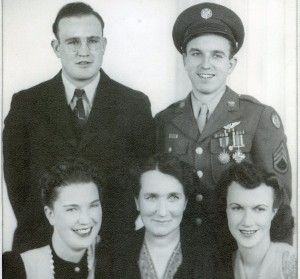
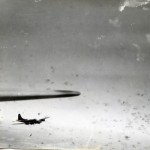 Dad, like many of the soldiers in that generation, never spoke of his time in the service during World War II, and all we knew was what little we heard from his family, and a couple of newspaper articles. Knowing my dad as we did, those years were his duty, but never his desire. Dad was a gentle man, and the idea of killing must have weighed heavily on him. Nevertheless, he knew it was his duty, and he would never have shirked his duty. There were a number of heroic times in Dad’s time in the service. He actually saved his crew, when he cranked down the landing gear just in time to hit the runway. It must have been damaged by the anti-aircraft flak, because it wouldn’t come down. There were other times that his actions saved his crew, such as the enemy planes that he shot down. They were a good team. They were all heroes…every single one.
Dad, like many of the soldiers in that generation, never spoke of his time in the service during World War II, and all we knew was what little we heard from his family, and a couple of newspaper articles. Knowing my dad as we did, those years were his duty, but never his desire. Dad was a gentle man, and the idea of killing must have weighed heavily on him. Nevertheless, he knew it was his duty, and he would never have shirked his duty. There were a number of heroic times in Dad’s time in the service. He actually saved his crew, when he cranked down the landing gear just in time to hit the runway. It must have been damaged by the anti-aircraft flak, because it wouldn’t come down. There were other times that his actions saved his crew, such as the enemy planes that he shot down. They were a good team. They were all heroes…every single one.
While my dad was a hero during World War II, I will always consider his most important accomplishment, his family. Without my dad’s safe return from the war, we would not exist. He met my mom, Collene Byer Spencer when she was still a schoolgirl, but even then, they knew it was that forever love. They married in 1953, an 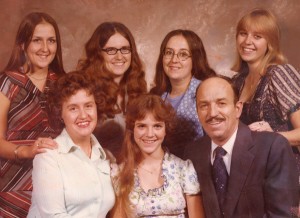
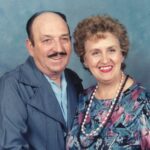 became the parents of five daughters, Cheryl, Masterson, Caryn Schulenberg (me), Caryl Reed, Alena Stevens, and Allyn Hadlock. They went on to have grandchildren and great grandchildren…all of whom owe their lives to the fact that dad came home from war. For that I praise God, and I give Him all the glory. Today would have been my dad’s 99th birthday. Happy birthday in Heaven, Dad. We love and miss you very much and look forward to seeing you again when we get to Heaven.
became the parents of five daughters, Cheryl, Masterson, Caryn Schulenberg (me), Caryl Reed, Alena Stevens, and Allyn Hadlock. They went on to have grandchildren and great grandchildren…all of whom owe their lives to the fact that dad came home from war. For that I praise God, and I give Him all the glory. Today would have been my dad’s 99th birthday. Happy birthday in Heaven, Dad. We love and miss you very much and look forward to seeing you again when we get to Heaven.

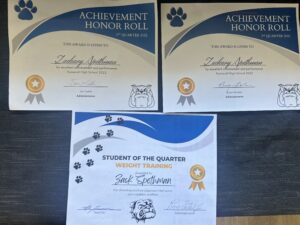 My grandnephew, Zack Spethman, like so many other students, got caught in the Covid Funk, as his mom, Jenny Spethman, calls it. Many kids who had to suddenly switch to online school, and a school year that ended way too soon, struggled not only at the end of 2020, but well into 2021 and beyond. Zack was one of those kids, but Zack is also a determined student, and while it was a lot of hard work, Zack has fought his way back, and is doing so well that he is on track to actually graduate a little early next year. Now that is something to be proud of, and we are very proud of him. Such a comeback is not common, and in many cases is viewed as impossible.
My grandnephew, Zack Spethman, like so many other students, got caught in the Covid Funk, as his mom, Jenny Spethman, calls it. Many kids who had to suddenly switch to online school, and a school year that ended way too soon, struggled not only at the end of 2020, but well into 2021 and beyond. Zack was one of those kids, but Zack is also a determined student, and while it was a lot of hard work, Zack has fought his way back, and is doing so well that he is on track to actually graduate a little early next year. Now that is something to be proud of, and we are very proud of him. Such a comeback is not common, and in many cases is viewed as impossible.


There are many sides to Zack. First and foremost, Zack is a very loving young man. His always quick to give out hugs to everyone in his family, and that’s a lot of people. We are a large family. No matter where he is, Zack always tries to make everyone feel welcome. He talks to everyone. Zack really has never met a stranger. He can start up a conversation with anyone. He is very kind to the kids in the family who are younger than he is. Zack knows that the younger kids are just trying to fit in, and he helps then to do so. No wonder everyone loves Zack.
Zack is always quick to help with projects his parents or siblings are doing. Zack is a tall, strong, muscular guy, like his dad, Steve Spethman, and that makes him a go-to guy for heavy work. Zacks loves being part of a great family 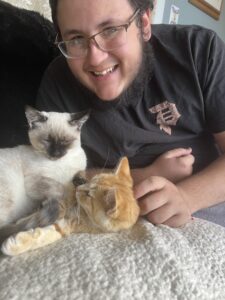
 unit. Zack and his brothers have taken hunting safety classes, and they, along with their dad all hunt. Hunting is a great way to supplement the family’s food supply, and they all love the meat from the game they kill.
unit. Zack and his brothers have taken hunting safety classes, and they, along with their dad all hunt. Hunting is a great way to supplement the family’s food supply, and they all love the meat from the game they kill.
Zack has a soft spot in his heart for the family pets, or any pets really. I think he gets it from his mom. Jenny has always loved animals of all kinds. In many ways, Zack reminds me of his mom. Zack can often be seen with the dogs and cats that the family has. He cuddles them, and they in turn love him very much. I’m not surprised that they love him. Everybody does. Today is Zack’s 18th birthday. Happy birthday Zack!! Have a great day!! We love you!!
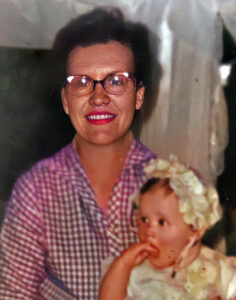
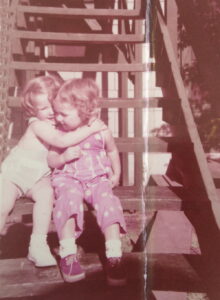 My aunt, Doris Spencer has a heart of gold. She is the type of person who always wanted to make sure everyone else had what they needed and that they were comfortable. It never mattered what time our family might pull into town for a visit. Even at midnight, she would get up and make us something to eat. It might just be a little snack, but she just always felt like we needed a little something after our travels. Aunt Doris is a great cook, although she doesn’t do much cooking these days. Nevertheless, I wish I had even a tenth of the amazing recipes that are stored in her head.
My aunt, Doris Spencer has a heart of gold. She is the type of person who always wanted to make sure everyone else had what they needed and that they were comfortable. It never mattered what time our family might pull into town for a visit. Even at midnight, she would get up and make us something to eat. It might just be a little snack, but she just always felt like we needed a little something after our travels. Aunt Doris is a great cook, although she doesn’t do much cooking these days. Nevertheless, I wish I had even a tenth of the amazing recipes that are stored in her head.
Aunt Doris has always been a happy person, and she has shared her sunny attitude with everyone who knew her. She quickly became my mom, Collene Spencer’s best friend, when Mom and my dad, Al Spencer moved from Casper, Wyoming to Superior, Wisconsin following their wedding in 1953. My mom was a young woman, living 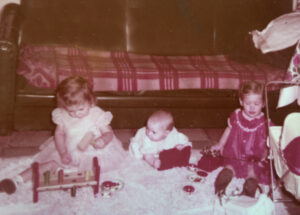 away from her family for the first time ever, and that can be more than a little scary, but Aunt Doris was there, and lived just across the back yard. Uncle Bill Spencer (my dad’s brother) and Aunt Doris owned both houses, and my parents rented from them. It was truly a blessing for my mom to have Aunt Doris so nearby.
away from her family for the first time ever, and that can be more than a little scary, but Aunt Doris was there, and lived just across the back yard. Uncle Bill Spencer (my dad’s brother) and Aunt Doris owned both houses, and my parents rented from them. It was truly a blessing for my mom to have Aunt Doris so nearby.
The two girls hung out together. Their daughters, Cheryl Masterson and later me, and our cousin, Pam Wendling (Aunt Doris’ oldest child) played together. Before there was a chance for the rest of our siblings to be on those playdates, my parents, my sister, and I moved back to Casper, Wyoming. That was a sad day all around. Our life was going to be in Wyoming, and I can’t imagine it any other way now, but Aunt Doris and her family’s life was in Superior, Wisconsin. It was the way it would be, and from that day on, we visited as much as we could, as did they. For Aunt Doris and my mom, it was especially sad, because they truly were best friends. They did everything together, and they would miss each other very, very much.
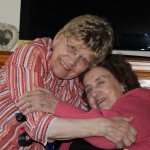
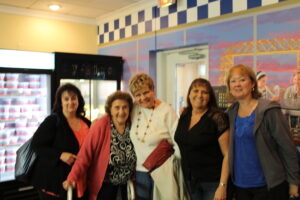 My mom is in Heaven now, but before she went home, my sister, Cheryl and I took her back to Wisconsin to see our precious family. It was such a blessed trip, and it was especially a blessing to see these two wonderful sisters-in-law and friends together again. It had been far too many years by then, so the time was especially precious to all of us, especially my mom. Today is Aunt Doris’ 99th birthday. Happy birthday Aunt Doris!! Have a wonderful day!! We love you!!
My mom is in Heaven now, but before she went home, my sister, Cheryl and I took her back to Wisconsin to see our precious family. It was such a blessed trip, and it was especially a blessing to see these two wonderful sisters-in-law and friends together again. It had been far too many years by then, so the time was especially precious to all of us, especially my mom. Today is Aunt Doris’ 99th birthday. Happy birthday Aunt Doris!! Have a wonderful day!! We love you!!

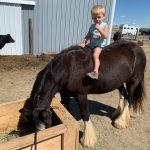 My grandnephew, Bowen Parmely is a very energetic little boy. He has two older sisters, Reagan and Hattie; and a younger sister, Maeve. I can’t say that Bowen always gets along with his sisters, but he would protect them with his life. That doesn’t mean he won’t pick on them, however. He thinks he is the only one who is allowed…typical of brothers. Bowen is an energetic boy with a smile that lights up his face. He always seems to have a secret joke that he keeps inside himself. Something that he finds very funny. That way, he always has something to laugh about.
My grandnephew, Bowen Parmely is a very energetic little boy. He has two older sisters, Reagan and Hattie; and a younger sister, Maeve. I can’t say that Bowen always gets along with his sisters, but he would protect them with his life. That doesn’t mean he won’t pick on them, however. He thinks he is the only one who is allowed…typical of brothers. Bowen is an energetic boy with a smile that lights up his face. He always seems to have a secret joke that he keeps inside himself. Something that he finds very funny. That way, he always has something to laugh about.
Bowen pretty much loves anything his daddy, my nephew, Eric Parmely is doing, but Bowen especially loves 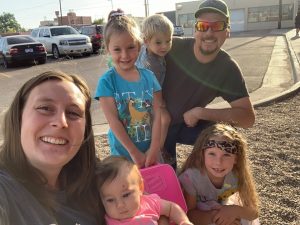 tractors, and of course, his favorite tractor is Gloria, the family tractor. Living on a farm makes that a good thing. I’m sure that as he gets older, Bowen will be his dad’s right-hand man on the farm. Bowen already loves to help his dad with whatever he is doing, and he truly loves the animals. He is learning to ride horses from his mom, Ashley Parmely, and he is quite good at it. He would gladly spend all day on the back of a horse. In fact, he would even eat his meals or snacks there if his mom would let him. Sometimes he gets to have a popsicle on his horse, but I doubt if his mom would agree to dinner.
tractors, and of course, his favorite tractor is Gloria, the family tractor. Living on a farm makes that a good thing. I’m sure that as he gets older, Bowen will be his dad’s right-hand man on the farm. Bowen already loves to help his dad with whatever he is doing, and he truly loves the animals. He is learning to ride horses from his mom, Ashley Parmely, and he is quite good at it. He would gladly spend all day on the back of a horse. In fact, he would even eat his meals or snacks there if his mom would let him. Sometimes he gets to have a popsicle on his horse, but I doubt if his mom would agree to dinner.
Bowen is a very helpful boy. He loves to help his mom with the cooking. Not every boy likes to cook, although 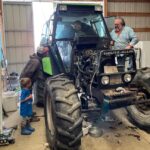
 lots of men cook. Boys usually don’t have the patience for cooking. There is usually too much prep work, and boys get bored, but Bowen enjoys it. I think Bowen just enjoys spending time with his parents. He likes doing the same things they do and learning from them. That is something they should really enjoy while they can, because those kid years go by so fast. Before you know it, they are all grown up and out on their own. Of course, that is still a little way off, but time really flies, so you should never waste it. Today is Bowen’s 6th birthday. Happy birthday Bowen!! Have a great day!! We love you!!
lots of men cook. Boys usually don’t have the patience for cooking. There is usually too much prep work, and boys get bored, but Bowen enjoys it. I think Bowen just enjoys spending time with his parents. He likes doing the same things they do and learning from them. That is something they should really enjoy while they can, because those kid years go by so fast. Before you know it, they are all grown up and out on their own. Of course, that is still a little way off, but time really flies, so you should never waste it. Today is Bowen’s 6th birthday. Happy birthday Bowen!! Have a great day!! We love you!!
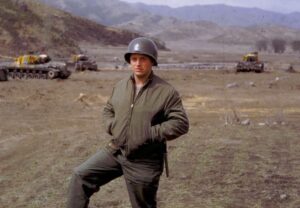 These days, our military men and women have a code…Leave No Man Behind. That was not always the case, or maybe it’s just not the case with all soldiers. On April 22, 1951, the Chinese Army launched the Spring Offensive against American forces during the Korean War. They sent 300,000 Chinese troops to attack the American lines. An influx of that magnitude would be overwhelming for any army. Within two days the American forces were being overwhelmed. A unit from the 8th Ranger Company (Airborne) was looking pretty grim on April 24, 1951. They had been ordered to move forward to gain intelligence on the Chinese. They quickly became surrounded by Chinese soldiers. It was turning into every soldier’s nightmare. It didn’t look like they were going to make it out of the Korean War alive. The men had not been captured yet, but they were stranded where they were. They radioed their situation, hoping for rescue, but no one was willing to help.
These days, our military men and women have a code…Leave No Man Behind. That was not always the case, or maybe it’s just not the case with all soldiers. On April 22, 1951, the Chinese Army launched the Spring Offensive against American forces during the Korean War. They sent 300,000 Chinese troops to attack the American lines. An influx of that magnitude would be overwhelming for any army. Within two days the American forces were being overwhelmed. A unit from the 8th Ranger Company (Airborne) was looking pretty grim on April 24, 1951. They had been ordered to move forward to gain intelligence on the Chinese. They quickly became surrounded by Chinese soldiers. It was turning into every soldier’s nightmare. It didn’t look like they were going to make it out of the Korean War alive. The men had not been captured yet, but they were stranded where they were. They radioed their situation, hoping for rescue, but no one was willing to help.
Captain James Herbert, the company commander, and his men (87 enlisted, three officers) were able to bypass a good portion of the advancing Chinese units, but eventually, became cut off from the US lines. Herbert called for artillery fire and air strikes against the approaching Chinese. To his shock, he was told to “get out as best you can” and left to figure out their escape on their own. Unfortunately, Herbert was seriously injured in the crossfire, receiving bullets in the throat, shoulder and arm. His throat was in bad shape, and he had to compress the holes on either side of his neck himself, because a tourniquet would have choked him to death. As a result of his injuries, he was no longer able to make the radio transmissions for help.
With Herbert seriously injured, acting communications chief Corporal Eugene Rivera took over, desperate to save the men. Rivera estimated that the Rangers had about 20 minutes before the Chinese reached their position. He immediately crawled his way to the top of a napalm-fried hill to reach a radio signal. While there, e had a great view of the surrounding area, and soon, with great relief, he saw what he called “the most beautiful sight of my life.” Lieutenant David Teich of Company C, 6th Tank Battalion heard the radio communications from the Rangers. He knew those men needed serious help, and immediate action was needed. Teich approached his captain to see if he and his fellow tankers could attempt a rescue mission, but was told, “We’ve got orders to move out. Screw them. Let them fight their own battles.” Stunned, Teich made the decision to disobey the orders of his captain. Teich, decided to stay and lead four tanks to rescue the Rangers who had been cut off by the Chinese forces. While Teich and the brave men who stayed with him made their way to the Rangers’ location, Teich’s captain and other US troops traveled south to safety.
Had it not been for Teich and his brave men, Rivera and his 65 men would have been doomed. There was no 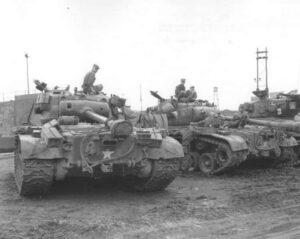 way for them to get out on their own. Teich and his men made their way to Rivera’s position on Hill 628 and retrieved the stranded Rangers. Herbert has since reflected on that day, saying, “Though we don’t always say it, Dave Teich saved our lives. If it wasn’t for him, we figure all of the survivors of the battle would have been killed or captured by the Chinese. We look upon Dave as our savior.” A total of 65 Rangers had survived and reached safety that day, because of Lieutenant David Teich. To this day, some of them still send letters of thanks to him, despite not knowing each other personally. As to the other men and their captain…well, as far as I am concerned, theirs was a despicable act of cowardice. They would have wanted others to come to their rescue, but they chose to run!! I’ll never see it differently.
way for them to get out on their own. Teich and his men made their way to Rivera’s position on Hill 628 and retrieved the stranded Rangers. Herbert has since reflected on that day, saying, “Though we don’t always say it, Dave Teich saved our lives. If it wasn’t for him, we figure all of the survivors of the battle would have been killed or captured by the Chinese. We look upon Dave as our savior.” A total of 65 Rangers had survived and reached safety that day, because of Lieutenant David Teich. To this day, some of them still send letters of thanks to him, despite not knowing each other personally. As to the other men and their captain…well, as far as I am concerned, theirs was a despicable act of cowardice. They would have wanted others to come to their rescue, but they chose to run!! I’ll never see it differently.
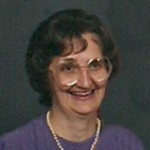
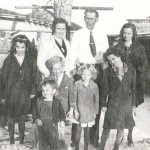 My aunt, Deloris “Dee” Johnson was such a sweet person. She was the third child of my grandparents, George and Hattie Byer, and she truly loved her little siblings. She was happy to teach them things, and when she could, she really enjoyed buying things for them. One of the biggest gifts was a piano that graced Grandma Byer’s house for the rest of her life. We all played on that piano, and sometimes I wonder how Grandma kept her sanity. Nevertheless, that piano was a great blessing, and it was Aunt Dee’s great pleasure to gift it to her family. Aunt Dee was really a very special sister to her siblings.
My aunt, Deloris “Dee” Johnson was such a sweet person. She was the third child of my grandparents, George and Hattie Byer, and she truly loved her little siblings. She was happy to teach them things, and when she could, she really enjoyed buying things for them. One of the biggest gifts was a piano that graced Grandma Byer’s house for the rest of her life. We all played on that piano, and sometimes I wonder how Grandma kept her sanity. Nevertheless, that piano was a great blessing, and it was Aunt Dee’s great pleasure to gift it to her family. Aunt Dee was really a very special sister to her siblings.
Aunt Dee had a big imagination. She wanted to see how it felt to be a bird, so she gathered up one of her younger siblings, wrapped up in a trench coat, and stood in the wind. Of course, they didn’t really fly, but it felt like it. I know, because I’ve done that myself. It’s lots of fun. My mom, Collene Spencer, Aunt Dee’s younger sister said that her sister was always inventing something, but Mom didn’t tell me what. I’m sure that over the years everyone forgot what they were, because if they weren’t successful, that would be the end of it. Her son, Elmer did say that his mom was the true inventor of the “shoe watch.” That was an invention she started by attaching a watch to her shoe to help her be on time. It didn’t help Aunt Dee, but then being on time was something that the Byer family was famous for not being.
Aunt Dee grew up in a household of singing. Grandma Byer made housework fun for her nine children with the 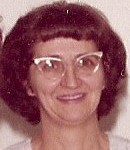
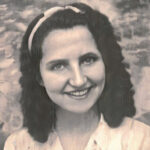 “sing while you work” concept. Aunt Dee, like most of her siblings carried that into her adult life. I think they all thought that singing gave them a sunny disposition, and I would have to agree. Having a mom who sings around the house, makes for a lighthearted home. I think that as a child of a song-filled home, my cousins would agree that a singing mom is one of the more pleasant memories of our childhood. Today would have been my Aunt Dee’s 92nd birthday. She has been in Heaven now for 27 years. I find that so hard to believe. Happy birthday in Heaven, Aunt Dee. We love you and still miss you very much.
“sing while you work” concept. Aunt Dee, like most of her siblings carried that into her adult life. I think they all thought that singing gave them a sunny disposition, and I would have to agree. Having a mom who sings around the house, makes for a lighthearted home. I think that as a child of a song-filled home, my cousins would agree that a singing mom is one of the more pleasant memories of our childhood. Today would have been my Aunt Dee’s 92nd birthday. She has been in Heaven now for 27 years. I find that so hard to believe. Happy birthday in Heaven, Aunt Dee. We love you and still miss you very much.
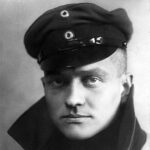
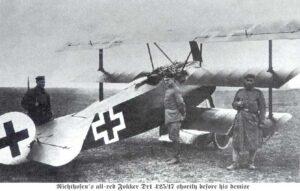 There were amazing pilots on both sides of World War I. One fighter pilot who really stood out as a superstar was Baron von Richthofen, known to the world as the Red Baron. The Red Baron was born on May 2, 1892, into a family of Prussian nobles. Growing up in the Silesia region of what is now Poland, he lived the kind of life you would expect of a nobleman. He passed the time playing sports, riding horses, and hunting wild game, a passion that would follow him for the rest of his life. As was common and on the wishes of his father, Richthofen was enrolled in military school at age 11. Many people felt that military school would provide the best discipline and training, especially if one were going to be an officer. Shortly before his 18th birthday, he was commissioned as an officer in a German cavalry unit.
There were amazing pilots on both sides of World War I. One fighter pilot who really stood out as a superstar was Baron von Richthofen, known to the world as the Red Baron. The Red Baron was born on May 2, 1892, into a family of Prussian nobles. Growing up in the Silesia region of what is now Poland, he lived the kind of life you would expect of a nobleman. He passed the time playing sports, riding horses, and hunting wild game, a passion that would follow him for the rest of his life. As was common and on the wishes of his father, Richthofen was enrolled in military school at age 11. Many people felt that military school would provide the best discipline and training, especially if one were going to be an officer. Shortly before his 18th birthday, he was commissioned as an officer in a German cavalry unit.
Richthofen transferred to the Air Service in 1915, and in 1916 he became one of the first members of fighter squadron Jagdstaffel 2. He was a natural and quickly distinguished himself as a fighter pilot. Then, in 1917 became the leader of Jasta 11. He would go on to lead the larger fighter wing Jagdgeschwader I, which was also known as “The Flying Circus” or “Richthofen’s Circus” mostly because of the bright colors of its aircraft, but maybe because of the way the unit was transferred from one area of Allied air activity to another. When units were moved, it was like a travelling circus. They moved and often set up in tents on improvised airfields.
Between September 1916 and April 1918, he shot down 80 enemy aircraft. That was more than any other pilot during World War I. The Red Baron once wrote, “I never get into an aircraft for fun. I aim first for the head of the pilot, or rather at the head of the observer, if there is one.” He was well known for his crimson-painted Albatros biplanes and Fokker triplanes, and the “Red Baron” by 1918, Richthofen was regarded as a national hero in Germany, and strangely, Richthofen was even respected by his enemies, which is very rare indeed.
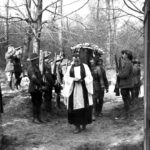
Loyal to the end, Richthofen received a fatal wound while flying over Morlancourt Ridge near the Somme River, just after 11:00am on April 21, 1918. He had been pursuing, a Sopwith Camel piloted by Canadian novice Wilfrid Reid “Wop” May of the Number 209 Squadron, Royal Air Force. May had just fired on the Red Baron’s cousin, Lieutenant Wolfram von Richthofen. When he saw his cousin being attacked, the Red Baron flew rescue him. He fired on May’s plane, causing him to pull away, then he chased May across the Somme. The Baron was spotted and briefly attacked by a Camel piloted by May’s school friend and flight commander, Canadian Captain Arthur “Roy” Brown. Brown had to dive steeply at very high speed to intervene, and then had to climb steeply to avoid hitting the ground. Richthofen turned to avoid this attack, and then resumed his pursuit of May.
During this final stage in his pursuit of May, Richthofen was hit by a single .303 bullet through the chest, severely damaging his heart and lungs. He would have bled out in less than a minute. Now pilotless, the plane stalled and went into a steep dive. It hit the ground in a field on a hill near the Bray-Corbie Road, just north of the village of Vaux-sur-Somme. This was in a sector defended by the Australian Imperial Force (AIF). The plane bounced heavily when it hit the ground, and the undercarriage collapsed. The fuel tank was smashed before the aircraft skidded to a stop. Several witnesses, including Gunner George Ridgway, reached the crashed plane and found Richthofen already dead, and his face slammed into the butts of his machine guns, breaking his nose, fracturing his jaw and creating contusions on his face.
Number 3 Squadron AFC’s commanding officer Major David Blake, who was responsible for Richthofen’s body, regarded the Red Baron with great respect. It was Blake who was responsible for organizing the funeral, and he decided on a full military funeral. Richthofen’s body was buried in the cemetery at the village of Bertangles, near Amiens, on April 22, 1918. Six of Number 3 Squadron’s officers served as pallbearers, and a guard of honor from the squadron’s other ranks fired a salute. Allied squadrons stationed nearby presented memorial 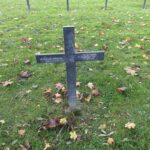
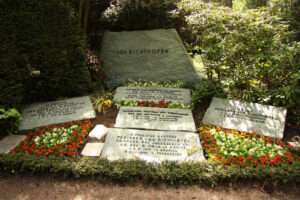 wreaths, one of which was inscribed with the words, “To Our Gallant and Worthy Foe.” It was an extremely respectful way to care for the body of the enemy, and for that, I have much respect for the Number 3 Squadron. Even though this man was the enemy, they knew he was just doing his job, as they would do theirs. It wasn’t personal, it was just war. In 1975 the body was moved to a Richthofen family grave plot at the Südfriedhof in Wiesbaden.
wreaths, one of which was inscribed with the words, “To Our Gallant and Worthy Foe.” It was an extremely respectful way to care for the body of the enemy, and for that, I have much respect for the Number 3 Squadron. Even though this man was the enemy, they knew he was just doing his job, as they would do theirs. It wasn’t personal, it was just war. In 1975 the body was moved to a Richthofen family grave plot at the Südfriedhof in Wiesbaden.
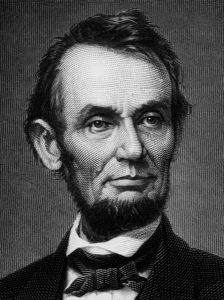
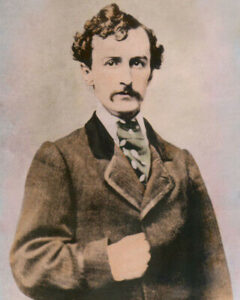 John Wilkes Booth was an actor, and as such, he had an expectation of applause following a performance. That is just what he thought the assassination of President Lincoln was. No, he didn’t think it was fake. He knew he was murdering the President of the United States, but he somehow thought people would consider it one of his greatest performances…the crowning moment of his stage career. It never occurred to him that the people who had loved him as an actor would suddenly turn against him.
John Wilkes Booth was an actor, and as such, he had an expectation of applause following a performance. That is just what he thought the assassination of President Lincoln was. No, he didn’t think it was fake. He knew he was murdering the President of the United States, but he somehow thought people would consider it one of his greatest performances…the crowning moment of his stage career. It never occurred to him that the people who had loved him as an actor would suddenly turn against him.
At the very least, he expected to be greeted with applause and support by those sympathetic to the Confederacy. Instead, he found, much to his shock and great dismay, that he was a hounded man, and few wanted to associate with him. Oh, the loyalists to the Confederacy did their duty by him, but with great reluctance. He first encountered this reaction when he and David Herold, who was an American pharmacist’s assistant and Wilkes accomplice in the assassination of Abraham Lincoln, stumbled upon a man in the dark, while searching for the home of Colonel Cox. The man, a local named Oswell Swann, reluctantly agreed to guide then to the Cox home, but only if he received payment for his services. He considered it just reward for the risk he was taking. Afterward, Swann collected his fee and vanished into the night, leaving the fugitives to the “hospitality” of Colonel Cox. That “hospitality” consisted of a few supplies, including whiskey, and a servant to lead the men to a hiding place in the woods. Cox certainly didn’t want these men to be found in his house.
Cox informed Booth that he was to “remain hidden in the woods until contacted.” Then Cox sent for Thomas Jones, a Confederate agent with experience in smuggling spies and information across the Potomac River into Virginia. Jones agreed to get them out and guide them across the Potomac, for a fee, but when he visited the fugitives in the woods, where they hid in a pine thicket, he told them it would be several days before he could do so. The manhunt for Booth and Herold was massive. Federal troops combed the area, searching properties and interrogating citizens over whether they had seen two men traveling together. Booth was very distressed, because instead of receiving the expected support and appreciation of the south, Booth found himself confined to a pine thicket!! Jones provided the men with newspapers, from which Booth discovered that he was widely considered a villainous murderer, rather than the Confederate hero he had expected to be. He wrote about his “horrible” fate, and the “injustice” of it all, in a diary he kept in an appointment book.
Federal authorities had most of the conspirators who had planned to kidnap Abraham Lincoln in custody by April 20, 1865. Several were not party to the assassination, but because they were involved in the kidnapping plans, they were held anyway. Three men were still not in custody…Booth, Herold, and John Surratt remained at large. The War Department put out wanted poster, released in Washington on April 20, offering a $50,000 reward for Booth, and $25,000 apiece for Herold and Surratt. By then, Surratt was hiding out in Canada, even though he knew that his mother was being held in federal custody. Coward that he was, Surratt was making plans to flee to Europe. Booth and Herold continued to cower in a pine thicket, relatively helpless. They didn’t dare leave, because they would be seen and immediately arrested. A dejected Booth spent his time drinking whiskey and scribbling in his makeshift diary over the unfairness of his reception. He believed his action had made him a martyr to the Confederate cause.
When the fugitives finally attempted to cross the Potomac, on about April 21, Jones’s guidance consisted of verbal instructions directing them to a waiting boat. These men had no boating experience, and the night was windy. The tides and swift current didn’t help matters either. Nor did the gunboats in the area. Booth whined into his diary, “last night being chased by gunboats till I was forced to return wet, cold, and starving.” Needless to say, the crossing was a failure, but Booth’s overly dramatic entry exaggerated what may have been an encounter with USS Juniper, positioned in the river near their point of crossing. Juniper’s log did not include a report of chasing anything that night. Booth likely spotted the gunboat, and in a panic, returned to the Maryland shore. Booth’s fugitive days ended when he was caught on April 26, 1865, near Port Royal, Virginia. As Booth and his co-conspirator, David Herold, cowered inside a barn, the soldiers demanded that they surrender. John Wilkes Booth died in agonizing fashion at the hands of Union soldiers in Port Royal, Virginia, 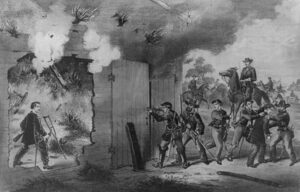
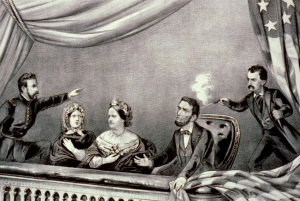 two weeks after he assassinated Abraham Lincoln. When the Union soldiers demanded their surrender, Herold complied. But Booth refused. He didn’t leave the barn until one of the soldiers set it on fire. As he tried to sneak out in the shadows and flame, a shot cracked through the silent night…and found its mark. Booth briefly held on to life, but in the end, the bullet would be his demise…in true disgraced style.
two weeks after he assassinated Abraham Lincoln. When the Union soldiers demanded their surrender, Herold complied. But Booth refused. He didn’t leave the barn until one of the soldiers set it on fire. As he tried to sneak out in the shadows and flame, a shot cracked through the silent night…and found its mark. Booth briefly held on to life, but in the end, the bullet would be his demise…in true disgraced style.
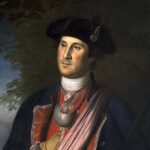
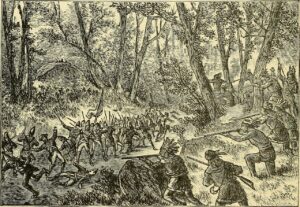 We all think of our first president as being a patriot hero of the Revolutionary War, leading to the independence of our nation and the many freedoms we now enjoy, and he was, but he was other things before he was all that. Everyone is other things before they become the thing they were destined to become. George Washington was born on February 22, 1732, at Popes Creek in Westmoreland County, in the British colony of Virginia. He was the first of six children of Augustine and Mary Ball Washington. His father was a justice of the peace and a prominent public figure who had four additional children from his first marriage to Jane Butler. He did come from a prominent family, and that could have afforded him much, but that wouldn’t have been his style.
We all think of our first president as being a patriot hero of the Revolutionary War, leading to the independence of our nation and the many freedoms we now enjoy, and he was, but he was other things before he was all that. Everyone is other things before they become the thing they were destined to become. George Washington was born on February 22, 1732, at Popes Creek in Westmoreland County, in the British colony of Virginia. He was the first of six children of Augustine and Mary Ball Washington. His father was a justice of the peace and a prominent public figure who had four additional children from his first marriage to Jane Butler. He did come from a prominent family, and that could have afforded him much, but that wouldn’t have been his style.
It is well known that George Washington led the Continental Army to victory against Great Britain in the 1770s and early 1780s, but a few decades earlier, like most young adults, George had a different view of things, and he actually fought for the British Empire. In 1754, 22-year-old Washington, then a lieutenant colonel for the British, managed to actually start a war with his actions. It is said that young Washington led his regiment into a skirmish with French troops, and the action escalated into the French and Indian War. One eyewitness totally blamed Washington, saying, “Colonel Washington begun himself and fired and then his people.” It was “a shot heard ’round the world,” sparking an epic, imperial struggle between Great Britain and France.
In reality, it wasn’t Washington’s fault. Tensions between France and Great Britain had been brewing in North America for more than a century. America had a lot of land, and with that would come a lot of power. The British and the French had been fighting over that land and that power. Swept up in the struggle were the inhabitants of New France, the British colonists, the Native Americans, and regular troops from France and Britain. What George Washington did that day really had little to do with a battle that was coming no matter 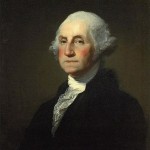
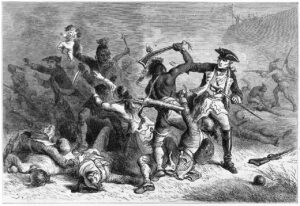 what. Had he not attacked, the war would just have started days or weeks down the road, but it would have started, nevertheless. The British and the French saw the vast lands of what would become the United States of America as a way to expand their power in the world, and like most wars, the land disputes brought with them an explosion that really could be heard around the world. What Washington did was a small battle in a much bigger war. And what he did later, changed history forever.
what. Had he not attacked, the war would just have started days or weeks down the road, but it would have started, nevertheless. The British and the French saw the vast lands of what would become the United States of America as a way to expand their power in the world, and like most wars, the land disputes brought with them an explosion that really could be heard around the world. What Washington did was a small battle in a much bigger war. And what he did later, changed history forever.

